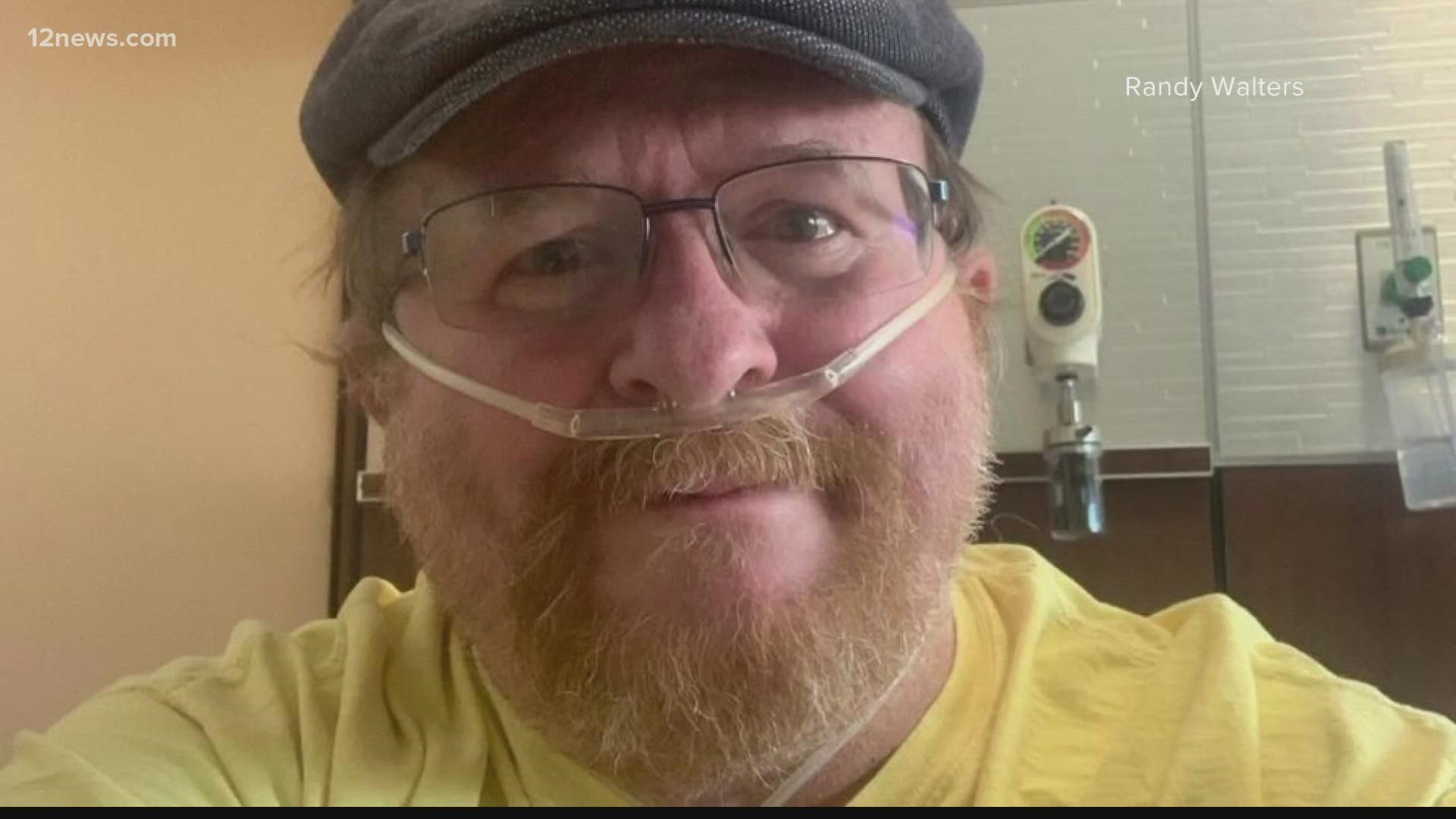PHOENIX — When you test positive for COVID-19, you expect the quarantine period and maybe some symptoms.
"I thought I'd be okay," Randy Walters said.
Walters said he tested positive before starting to feel symptoms. He said it was on his and his wife's anniversary when the pulse oximeter measured his stats as low.
"The pulse ox was reading pretty low, like 84, 83," Walters said.
He said his daughters told his wife to take him to the hospital.
"That's what saved my life," Walters said. "They got me in right in time."
Walters said he was admitted to the hospital one year ago Tuesday. He said he spent 20 days in isolation there and was nearly put on a ventilator.
"I made it," Walters said.
But his experience with COVID didn't end there. Walters said he's been experiencing long-term COVID symptoms since he was released. Walters said he spent a couple of months on oxygen after he was released, lost his spleen and part of his lung.
"Even today, I just had a nuclear stress test done last week," Walters said. "Because I can't walk more than about 80 to 90 steps, then I got to stop and rest."
Long-haul COVID
Long-haul COVID symptoms, like the virus itself, seemingly affect everyone differently.
"It's not a short-term disease for everyone," Kristen Pogreba-Brown, Ph.D., MPH, a lead investigator for the Arizona CoVHORT study, and an assistant professor with the University of Arizona said.
The Arizona CoVHORT study is looking at how COVID-19 is affecting Arizonans, including those suffering from "long COVID."
"Fatigue and Malaise is something that probably we could have predicted," Pogreba-Brown said. "But things like COVID toes and hair loss and tinnitus, and ringing in your ears, those are all outcomes that I don't think we could have predicted."
The team's latest look at those participating in the statewide study found that 59% of people who have had COVID, still had symptoms a month after they tested positive.
After three months from the positive test, the team has found that 52% of people were still experiencing symptoms.
Long COVID and omicron
The study has identified certain risk factors, including more severe cases, that are more likely to develop long-COVID in some individuals.
In Arizona, Pogreba-Brown said people who are Hispanic or Latinx are also having a higher prevalence of longer-lasting symptoms.
Currently, in Arizona, the omicron variant makes up 98% of the genomes T-Gen has sequenced in the last week. Currently, Omicron is appearing to be milder than previous variants like Delta.
However, the Arizona Department of Health Services reported about 140,000 new COVID cases in the last seven days, which health experts believe is undercounted because of at-home tests that aren't reported to the state.
Pogreba-Brown said it's not known what risk omicron might pose in terms of people developing long COVID. Since there are more breakthrough cases being reported, the variant appears milder.
But Pogreba-Brown said it's unknown what risk there might be to those who are not vaccinated.
"I think their chances of developing long COVID are probably equal to or similar to what we saw with the original wave of COVID infections when we didn't have vaccines on board," Pogreba-Brown said.
Unanswered Questions
With all that has been found out about COVID-19 and long COVID, there's still much more that's unknown.
"I think many of us are going to be working on this for a long time because it's, there's so many more questions than answers,” Pogreba-Brown said.
Pogreba-Brown said she expects their research, and the work being done with the NIH RECOVER initiative, will help to start to look at what can be done to help those battling long COVID.
"We need to remember that there is going to be a burden to our community, and we need to continue to be investigating how we can describe it better so that we can then do as much as we can to mitigate it,” Pogreba-Brown said.
Pogreba-Brown added that the study is continuously looking for participants, you can find information on the study here.
Healing
In the past year, Walters said he's experienced some relief for his long COVID symptoms. Walters said he goes to the gym three times a week now and swims at his retirement community pool regularly.
After Walters got the first two COVID-19 vaccine shots he noticed an improvement in his long COVID symptoms.
"I've been blessed," Walters said. "I mean, like, even if I walk 90 steps, that's more than a lot of people can walk, you know? So I'll take it. I'm finally starting to feel really good."
Walters, who is a member of the Facebook group Arizona COVID-19 Long Haulers, said not all those in the group saw some symptom relief from the vaccine, however.
Adding, he feels blessed in how much he's able to do.
"The second vaccine, it was almost like I was reborn. Within 48 hours, I felt like Superman," Walters said.
Despite what's not known yet, Pogreba-Brown said, people experiencing long COVID symptoms are finding relief.
"It's not that, you know, we're having people who have gotten this and just never get better,” Pogreba-Brown said. “We are having people recover. But it does take time, and it does take therapy.”
COVID-19 News and Updates
Subscribe to the 12 News YouTube channel to receive notifications on the latest videos about the latest information on the coronavirus.

